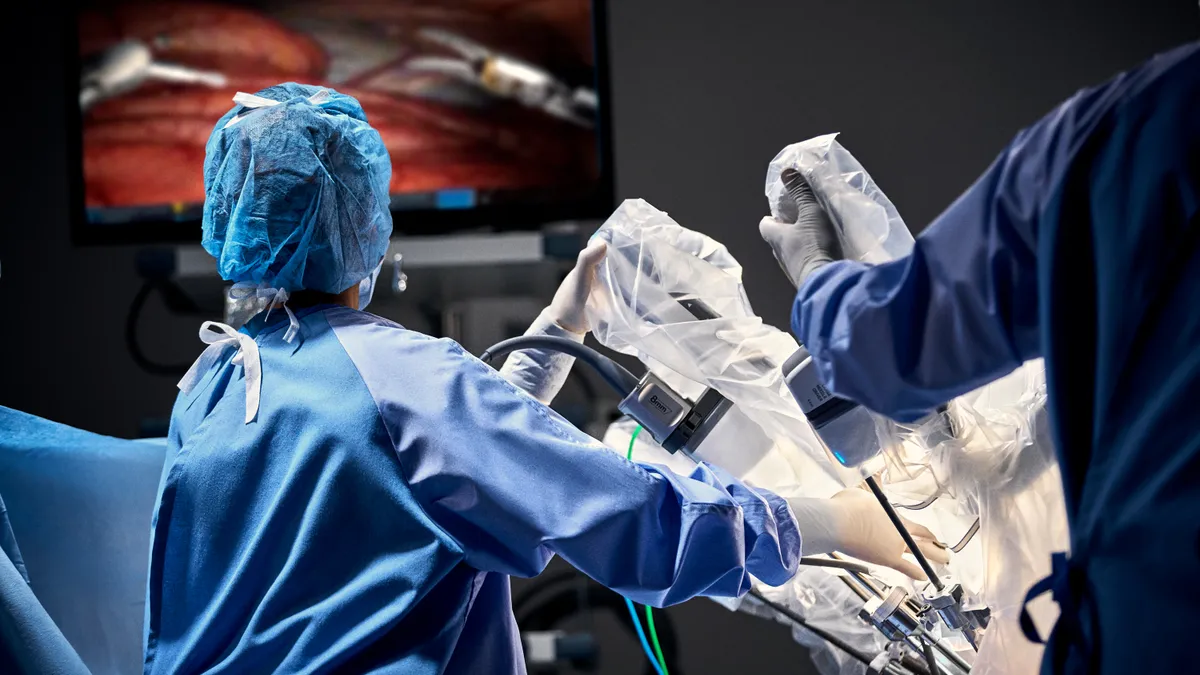Dive Brief:
- Intuitive Surgical beat Wall Street's expectations with third quarter revenues of $1.13 billion, up 23% over last year, buoyed by growth in U.S. general surgery procedures and worldwide urologic procedures, the robotic surgery giant reported Thursday.
- Also leading the 20% rise in worldwide procedures were prostatectomy and hysterectomy operations, which together account for four of every 10 da Vinci procedures taking place in the U.S., RBC Capital Markets analyst Brandon Henry said. Still, taking share in general surgery remains the most significant growth catalyst for Intuitive, Henry said in a note to investors following the company's earnings call.
- Revenue growth of 25% among Intuitive's instruments and accessories like staplers also contributed to Intuitive's beat, outpacing revenue growth tied to actual systems. Calvin Darling, senior director of investor relations, said revenue per procedure during the quarter was approximately $1,980, "the highest we've seen in quite some time."
Dive Insight:
The worldwide installed base of Intuitive's systems now numbers more than 5,400 and leasing arrangements continue to inch up in popularity. Of the 275 da Vinci systems shipped during the third quarter, approximately one-third (92 systems, up from 58 the year prior) were under operating lease and usage-based arrangements.
CFO Marshall Mohr said the company predicts the percentage of leasing and "alternative financing arrangements" will grow over time while the amount of trade-in transactions "will level off in the short term and then decline."
Intuitive continued its "measured" rollout of its SP, or single port, platform during the quarter, placing three of the systems. FDA has authorized the SP platform for use in transoral and urological indications.
But Intuitive reported at least one surgical indication for SP is delayed. The company is seeking a colorectal indication for SP but now expects it will require an IDE trial with follow-up analysis, meaning the company won't likely receive the indication in 2020, management said.
"While we had planned for a smoother launch of SP and product availability and new indications timelines, our teams are focused on building at scale and satisfying regulatory requirements for additional indications," CEO Gary Guthart told investors in prepared remarks Thursday.
Outside the U.S., total procedures grew 23%, with 36 systems placed in Europe, 27 in Japan and 10 in China.
Japan demonstrated more than 40% procedure growth during the quarter with reimbursement wins gradually driving adoption, executives said. But in China, procedure growth was below the international average.
Intuitive's overall better-than-expected results come during a week when smaller market hopefuls appear to be suffering.
Transenterix, a Morrisville, North Carolina-based robotic surgery system maker, announced Thursday it is "evaluating strategic alternatives" and restructuring after multiple quarters of selling just one of its systems. Toronto-based Titan Medical said Tuesday financial constraints and subsequently strained supplier relationships will delay the 510(k) filing of its own system.
Still, Intuitive faces imminent competition. U.K.-based CMR Surgical has begun the commercial rollout of its Versius system, announcing its first system sale this week. The product is meant to be more affordable and portable than da Vinci technology. But CMR cannot yet compete with Intuitive in the U.S. as it's awaiting FDA authorization on a submission filed this spring.
Medtronic at the end of September offered details to investors on its soft tissue robotic system, dubbed Hugo, which is slated for a U.S. launch about two years from now,. It aims to compete with da Vinci for colorectal, bariatric and thoracic surgeries, among others. RBC's Henry noted to investors that leasing agreements are beneficial because they allow Intuitive to place more of its systems before competitors' systems enter the market.
Mohr told investors Thursday it is "likely we will see increased price negotiations and elongated negotiation timeline as competition get closer to launching new products," which could result in profit fluctuations, he said.
The company plans to offer updated financial guidance in January.











